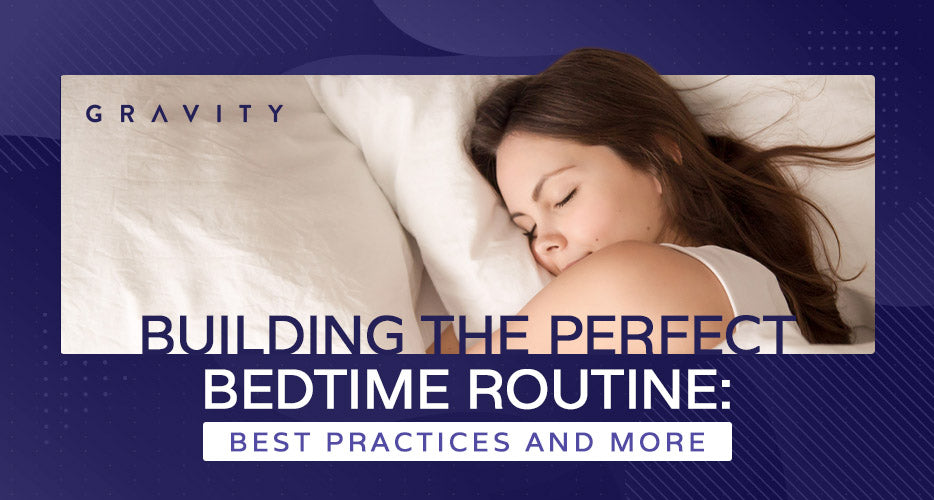
Jan 26, 2022
Building the Perfect Bedtime Routine: Best Practices and More

Falling asleep at a reasonable hour is often easier said than done. Whereas some people can hop right into their bed and drift off to dreamland within minutes, the majority of us struggle to shut off our brains in the evening. For those who find themselves in the latter category, the end result is usually a long night spent tossing and turning in bed, grappling with anxious thoughts and longing for sleep.
If this sleep conundrum sounds familiar, take heart. There may be a surprisingly simple remedy for your restless nights. In fact, a growing body of research suggests that following a simple bedtime routine can do wonders for your nightly slumber.
What Is a Bedtime Routine?
Your bedtime routine is the sequence of activities and actions you do in the hours leading up to bedtime. These actions can include anything from cuddling with a weighted blanket to drinking chamomile tea to journaling. The idea is to perform these actions in the same order every day to turn them into habits that help you achieve better sleep night after night.
Why Bedtime Routines for Adults Are Important
If there is one thing our brains crave, it’s consistency. Routines provide a sense of predictability, which has a profoundly relaxing effect on your mind and body. When you go through the same motions before bed every night, your brain begins to associate these activities with sleep, making it easier to slip into a peaceful slumber.
Other benefits of bedtime routines include:

- Optimizes your circadian rhythms. Following a consistent bedtime routine reinforces your circadian rhythms, which are the 24-hour cycles that regulate your sleep-wake cycle and countless other biological processes. Proper alignment of your circadian rhythms is key to keeping your body running optimally and lowering your risk of chronic health problems, such as cardiovascular disease, diabetes and cancer.
- Helps your brain switch gears. We all look forward to coming home and relaxing after a long day of work. Unfortunately, it’s not uncommon for our brains to still be clocked into work long after we’ve officially clocked out. Bedtime routines reduce mental and physical stimulation before bed, helping you transition from “work mode” to “relax mode.”
- Improves mental and physical health. A growing body of research suggests that bedtime routines can be beneficial for our health. For example, in a 2018 study from Duke University Medical Center, researchers found that adults with inconsistent sleep-wake times have a higher risk of disease, blood pressure and obesity. A different study from Michigan Medicine found that interns who experienced irregular sleep patterns were more likely to score higher on depressive symptom questionnaires.
Determining Your Ideal Bedtime
The first step to creating a soothing bedtime routine is determining when you want to go to bed and wake up. In an ideal world, we would just listen to our bodies and follow our natural sleep-wake cycle (as dictated by our circadian rhythms). Unfortunately, that's not realistic for everyone, thanks to work, school and childcare commitments.

To set a bedtime, you’ll need to figure out how much sleep you need and count backward from the time you need to wake up. According to the latest recommendations from the National Institute of Health, most healthy adults need somewhere between seven and nine hours of sleep every night. (Everyone is different, though, so you may need a little more or a little less.)
When choosing a bedtime, remember to give yourself at least 15 minutes to fall asleep. For example, if you want to fall asleep at 9:30 p.m., you’ll want to set your bedtime for 9:15 p.m.
11 Ideas for the Perfect Bedtime Routine
It’s one thing to say that you’ll fall asleep at a specific time, but it’s quite another to actually do it. To help prime your mind and body for sleep, try incorporating some of these science-backed bedtime rituals into your routine.

1. Put Your Phone Away
First, set up a recurring reminder on your phone that notifies you when it’s time to start winding down for bed. Once you receive this notification, put your phone in a drawer, a purse or some other hidden location where it’s completely out of sight. This may seem a bit overkill, but we assure you, your sleep quality will be better for it. In fact, evidence shows that the overuse of smartphones (as well as any other device that emits blue light) can have a negative effect on sleep quality.
2. Dim the Lights
You know those circadian rhythms we were talking about earlier? Well, as it turns out, light has a pretty powerful effect on them. Bright light signals to your body that it’s time to be awake, whereas darkness tells your body that it’s time for sleep. To make this work in your favor, dim the lights at least an hour before bedtime. When you’re ready to hit the hay, turn off the lights and make your bedroom as dark as possible by shutting your curtains.
Still seeing a sliver of light from the window or your hallway? Turn your bedroom into a cave of pitch-black darkness by wearing a weighted sleep mask. On top of creating pitch-black, our weighted eye masks deliver soothing pressure to your eyes to help you fall asleep.

3. Turn Down the Thermostat
About one hour before bedtime, turn down your thermostat by a few degrees or open a window to let in some cold air. According to the experts, sleeping in a colder bedroom is key to improving your sleep quality. That’s because colder temperatures can stimulate melatonin production, which is the hormone that makes you feel sleepy.
4. Make Yourself a Cup of Chamomile Tea
Many people find drinking a cup of warm tea to be a relaxing way to unwind from the day, especially if the tea in question is herbal. Chamomile tea, in particular, can induce feelings of relaxation and may help you fall asleep. In a 2015 study of postpartum mothers, researchers found that participants who drank chamomile tea slept better and reported fewer depression symptoms than the control group.
If you have a sensitive bladder, make sure you start drinking chamomile tea earlier in the evening — ideally, at least two hours before bedtime. Otherwise, your sleep could be disrupted due to the constant urge to urinate.
5. Take a Warm Bath
Warm baths have long been associated with relaxation. Most of us know that soaking in the tub feels amazing, but did you know that it can also help you sleep?
In a systematic data analysis published in Sleep Medicine Reviews, researchers looked at studies evaluating the link between bathing, water temperature and sleep quality. Their findings suggest that taking a warm bath one to two hours before bedtime not only helps people fall asleep faster, but also improves the quality of their sleep.
For added relaxation, consider adding some Epsom salt to your bath.
6. Practice Deep Breathing
Deep breathing (also known as belly breathing and diaphragmatic breathing) is a tried-and-true method for quelling stress before bed. Taking slow, deep breaths signals to your brain that it's time to calm down, which in turn tells your body to relax. Your heart rate slows and your blood pressure stabilizes, priming your body for bed.
If you’re having trouble focusing on your breathing, try the 4-7-8 breathing method, where you breathe in for a count of four, hold your breath for seven, exhale for eight and repeat the process three more times for a total of four full breaths. This breathing technique requires more focus than simply paying attention to your breathing, so your brain is less likely to wander back to distracting thoughts.

7. Cuddle Up with a Weighted Blanket
There is perhaps no better way to wipe away the stress of the day than by cozying up to a weighted blanket. First introduced by occupational therapists in the late ’90s, these trendy blankets use gentle pressure to create an overall sense of calm. And it’s not just a bunch of hype: evidence suggests that weighted blankets can indeed help poor sleepers get shut-eye.
Weighted blankets are an excellent addition to any bedtime routine and can be used alongside other relaxation techniques, such as guided imagery and meditation. Worried about being too hot at night underneath a weighted blanket? Stay cool and sweat-free with our revolutionary cooling weighted blanket.
8. Write in a Journal
Tomorrow’s to-do list weighing heavy on your mind? Writing in a journal can help. In a 2018 study, researchers found that people who wrote a to-do list before bed fell asleep faster than those who wrote about activities they had already completed. Not surprising, given that many people find jotting down their ideas before bed to be an immensely relaxing activity. Just be sure to use a pen and paper. As much as we love a good journaling app, the blue light emitted from your phone’s screen can lead to a restless night.
9. Listen to Bedtime Stories and Podcasts
Bedtime stories aren’t just for kids. Thanks to our never-ending quest for better sleep, bedtime stories for adults have become a huge selling point for many mindfulness and meditation apps. You can now fall asleep listening to the sound of Matthew McConaughey’s Southern drawl, Laura Dern’s raspy yet soothing voice or the silky-smooth cadence of Rege-Jean Page.
If bedtime stories aren’t your thing, you can also listen to autonomous sensory meridian response (ASMR) sounds. According to the National Sleep Foundation, ASMR sounds — like whispering and slow movements — may invoke a scalp-tingling sensation that some people find very relaxing.

10. Read
Diving into a good book — whether it’s an epic fantasy, a historical biography or a steamy romance — is a great way to let go of the day’s stresses and drift off to sleep. Reading pulls you into a different realm, allowing you to push aside self-sabotaging thoughts and worries that would otherwise keep you up at night. Plus, it’s good for the brain! Reading is thought to strengthen synapses in the brain, leading to improved memory and concentration and preventing age-related cognitive decline.
Tip: For a better night’s snooze, be sure to skip the e-reader (they emit small amounts of blue light) and read old-fashioned books instead.
11. Meditate
Meditating is a popular pre-bedtime ritual, and it’s not hard to see why. Heaps of evidence indicate that it’s an effective treatment for insomnia caused by excessive worry, anxiety and chronic pain. Even if you aren’t anxious or in pain, meditation can change brain activity to help you achieve high-quality sleep.
For High-Quality Sleep, Consistency Is Key
Many people assume that sleep is something that is largely out of their control, but that’s not entirely true. While certain conditions and sleep disorders can make sleep difficult to come by, there are also many activities one can do before bedtime to help usher in a good night's rest. The key to creating an effective bedtime routine, though, is to be consistent. By going to bed and waking up at the same time every day, you can keep your circadian rhythms in sync and achieve high-quality snooze night after night.
Ready to wind down for bed in style? Cozy up to our best-selling Gravity Weighted Blanket today and experience the soothing effects of deep touch pressure for yourself!
Image Credits
Jacob Lund/Shutterstock.com
Dean Drobot/Shutterstock.com
grandbrothers/Shutterstock.com
fizkes/Shutterstock.com
Algoffy/Shutterstock.com
Your use of this website, its content, and any products obtained through this website is at your own risk. This website, its content, and any products obtained through this website are provided on an “as is” basis, without any warranties of any kind, either express or implied, including warranties of merchantability, infringement of intellectual property, or fitness for any particular purposes. No warranty or representation is made with respect to the completeness, reliability, quality, or accuracy of this website or its content. This website, its content, and any products obtained through this website do not constitute medical treatment and is not a substitute for a medical examination or diagnosis. If you are dealing with a health condition check with your health care provider before using. This website may contain affiliate links that allow us to earn a commission on purchases made through such links. We may accept forms of advertising or sponsorships in connection with this website. There might also be paid topic insertions. We may accept and keep free products, services, and other forms of compensation from others.



